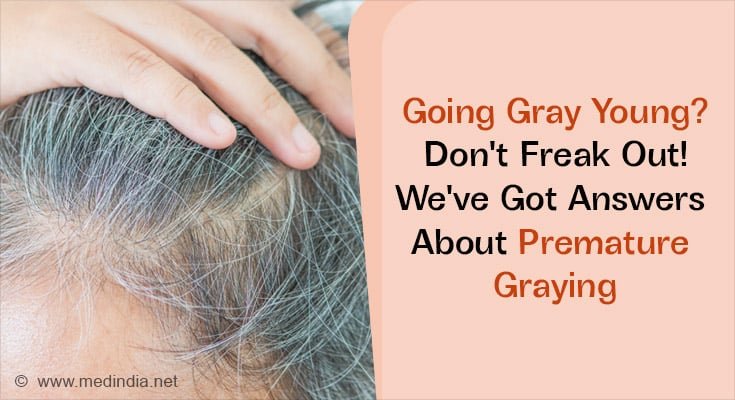Is Your Hair Turning Gray Early? Here’s Why

- Genetics, oxidative stress, and hormonal imbalances contribute to premature graying
- Lifestyle changes, such as a balanced diet and stress management, can delay graying
- Consult a dermatologist for personalized advice and treatment options
Premature graying of hair, or premature graying, is a condition where individuals experience the loss of natural hair pigmentation at an earlier age than usual. While graying of hair is a natural part of aging, premature graying can occur due to various factors, including genetics, lifestyle, and medical conditions. Understanding the causes behind premature graying is crucial for effective prevention and management (1✔ ✔Trusted Source
Premature Graying of Hair: Review with Updates
).
Causes of Premature graying
1. Genetics:
Genetic predisposition plays a significant role in determining when a person’s hair will start to turn gray. If your parents or grandparents experienced premature graying, there’s a higher likelihood that you might also develop it at a younger age.
2. Oxidative Stress:
Oxidative stress occurs when there’s an imbalance between the production of free radicals and the body’s ability to neutralize them with antioxidants. This oxidative stress can damage melanocytes, the cells responsible for producing hair pigment. Factors contributing to oxidative stress include smoking, pollution, UV radiation, and poor diet.
3. Vitamin Deficiencies:
Deficiencies in certain vitamins and minerals, such as vitamin B12, vitamin D, iron, and copper, can contribute to premature graying. These nutrients play crucial roles in the production of melanin, the pigment responsible for hair color.
4. Hormonal Imbalance:
Hormonal changes in the body can also affect melanin production, leading to premature graying. Conditions such as thyroid disorders, hormonal fluctuations during pregnancy or menopause, and hormonal imbalances can accelerate the graying process.
5. Stress:
Chronic stress can impact various bodily functions, including the health of hair follicles. It can disrupt the normal hair growth cycle and contribute to premature graying.
6. Autoimmune Disorders:
Autoimmune conditions such as vitiligo and alopecia areata can cause the immune system to attack melanocytes, leading to loss of pigmentation in hair follicles and premature graying.
7. Medical Treatments:
Certain medical treatments, such as chemotherapy and radiation therapy, can damage hair follicles and lead to premature graying as a side effect.
Advertisement
8. Lifestyle Factors:
Unhealthy lifestyle choices such as poor diet, lack of exercise, excessive alcohol consumption, and inadequate sleep can contribute to premature graying by increasing oxidative stress and disrupting normal bodily functions.
Prevention and Management of Early Graying of Hair
While some causes of premature graying, such as genetics, cannot be controlled, there are steps individuals can take to prevent or delay the onset of premature graying and manage the condition effectively:
1. Maintain a Balanced Diet:
Consuming a diet rich in vitamins, minerals, and antioxidants can support overall hair health and melanin production. Include foods such as leafy greens, nuts, seeds, fish, eggs, and fruits in your diet.
Advertisement
2. Manage Stress:
Practice stress-reducing techniques such as meditation, yoga, deep breathing exercises, or engaging in hobbies and activities you enjoy.
3. Avoid Smoking and Excessive Alcohol Consumption:
Both smoking and excessive alcohol intake can contribute to oxidative stress and accelerate the graying process. Quit smoking and limit alcohol consumption to promote healthier hair.
4. Protect Hair from UV Radiation:
Wear hats or use hair products containing SPF to protect your hair from the damaging effects of UV radiation.
5. Address Medical Conditions:
Seek medical attention for any underlying medical conditions such as thyroid disorders or hormonal imbalances that may contribute to premature graying.
6. Use Hair Care Products Wisely:
Avoid harsh chemical treatments and excessive heat styling, as these can damage hair follicles and exacerbate premature graying. Opt for gentle, natural hair care products and minimize the use of hair dyes containing harsh chemicals.
7. Consult a Dermatologist:
If you’re concerned about premature graying or experiencing sudden changes in hair color, consult a dermatologist or healthcare professional for proper evaluation and treatment recommendations.
Premature graying of hair can be a distressing experience for many individuals, but understanding the underlying causes and implementing preventive measures can help manage the condition effectively. By adopting a healthy lifestyle, addressing any underlying medical conditions, and taking steps to reduce oxidative stress, individuals can maintain healthier hair and delay the onset of premature graying. If you’re concerned about premature graying, seek guidance from a healthcare professional for personalized advice and treatment options.
Reference:
- Premature Graying of Hair: Review with Updates – (https://www.ncbi.nlm.nih.gov/pmc/articles/PMC6290285/)
Source-Medindia
Source link
#Hair #Turning #Gray #Early #Heres



